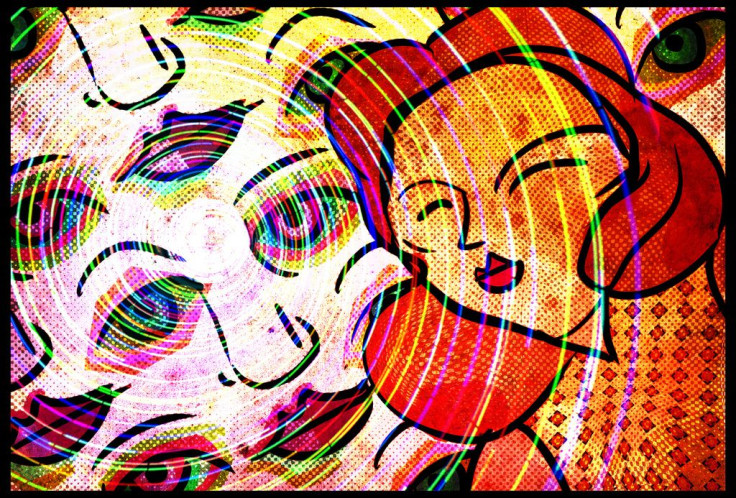Psychedelics Don’t Hurt Mental Health; Alcohol And Controlled Substances Still Riskiest

Acid trips and rainbow fantasies of the counter-culture aren’t what modern medicine is using lysergic acid and psilocybin for. But the prevailing stigma surrounding psychedelic drugs is that they are pure recreation, with room for abuse that can lead to the deletion of brain cells. New research hopes to break that misconception, finding no link between mental health problems and the use of psychedelic drugs.
We’ve grown accustomed to our prescribed medication looking a certain way. So-called real medicine arrives from a pharmacy in tiny orange bottles, not as paper squares or mushrooms with the word “magic” anywhere in the title. But LSD and psilocybin mushrooms are rising as viable forms of therapy for people with posttraumatic stress disorder and other diseases of the brain, which ultimately reduce their quality of life.
Small, But Promising
Many of the same benefits people get from taking psychedelic drugs recreationally are what could someday translate into clinical applications. Drugs like LSD and psilocybin mushrooms lead people to reconcile their lives with a larger sense of purpose. When MDMA was given to subjects in one 2013 study, the brain regions associated with memory and emotion went quiet. This gave scientists confidence that people with PTSD and other lingering anxiety may find a meaningful use for otherwise misunderstood substances.
Much of the evidence says our current attitudes toward popular drugs are backward. Advocates are taking solace in the slow but sure nationwide legalization of marijuana. But the abuse of alcohol and prescription medication too often flies under the radar. “Drug experts consistently rank LSD and psilocybin mushrooms as much less harmful to the individual user and to society compared to alcohol and other controlled substances,” said Teri Krebs, a neuroscientist at the Norwegian University of Science and Technology.
Krebs was a co-author of a new study that found among 19,000 people who used psychedelics, there was no evidence that demonstrated a causal link to mental health issues. If anything, the researchers argue, the drugs have had positive effects for the people who’ve taken them. “Many people report deeply meaningful experiences and lasting beneficial effects from using psychedelics,” Krebs said.
However, not all aspects of the study support the authors’ praise for the results, claims Dr. Howard Forman, Medical Director of the Addiction Consultation Service at Montefiore Medical Center. “Although they are looking at the mental health of survey respondents during the past year, they are looking at people who may have last used psychedelics 30 years ago,” Forman told Medical Daily in an email. “This study says nothing of the acute effects of psychedelics including frank psychosis, delirium, and agitation, which has probably been seen by anyone working overnight in a psychiatric emergency room.”
In that regard, Forman and the researchers seem to be on some common ground. Pål-Ørjan Johansen, a psychological researcher and Krebs’ co-author, said one limitation of the study was that it didn’t account for positive effects counterbalancing the negative ones, which would yield a neutral outcome. What’s more, many of the 19,000 respondents have used other, more harmful drugs in addition to psychedelics, such as MDMA, cocaine, and opiates. For Forman, the results may simply carry too many caveats to mean much. “I think the enthusiasm of the authors for reconsideration of the role of psychedelics in society and in psychiatric treatment is simply not matched by the results of their study.”
A Place In The Toolbox
Despite his caution, Forman concedes somewhere down the line psychedelic drugs may sit beside heavy hitters like Viagra and Prozac. “Are psychedelic class medications ready for prime-time? I don't think so,” he said. But “might they become essential parts of the psychiatrist's toolbox in the future given proper oversight? That can't be ruled out.”
In the end, and as it has been for roughly the two decades, the challenge is one of culture fueling scientific investigation. Science likes to lead people to new places, but it also often gets led. That has been the case with marijuana and the science of sexuality, spurred on by gay marriage politics, both of which stand as watershed movements in the U.S. If scientists can understand abnormalities of the brain better, they may find their palette for prescription drugs expands.
Depression is just one example. Over the last 30 years, Americans have experienced substantially more depressive symptoms, yet how we treat it hasn’t kept pace. The extent to which we develop alternative forms of therapy outside traditional antidepressants, be they behavioral approaches or new forms of drug therapy, the greater chance people have of shedding their terrible burden. With that in mind, Forman says, “I think this is an extremely valuable area to be researching.”



























